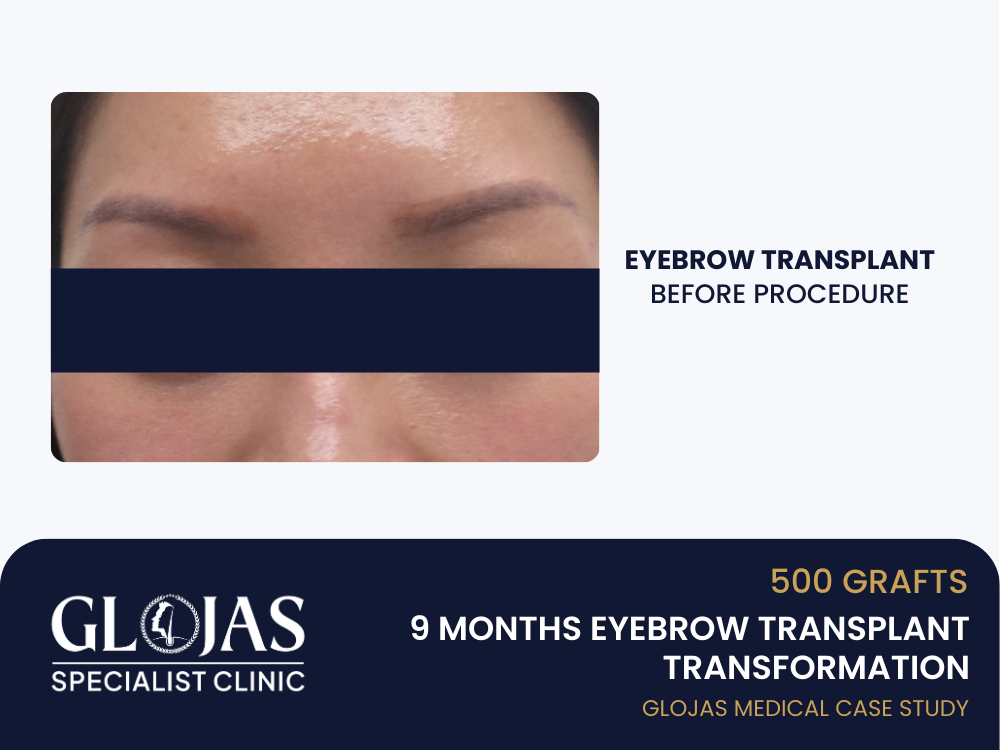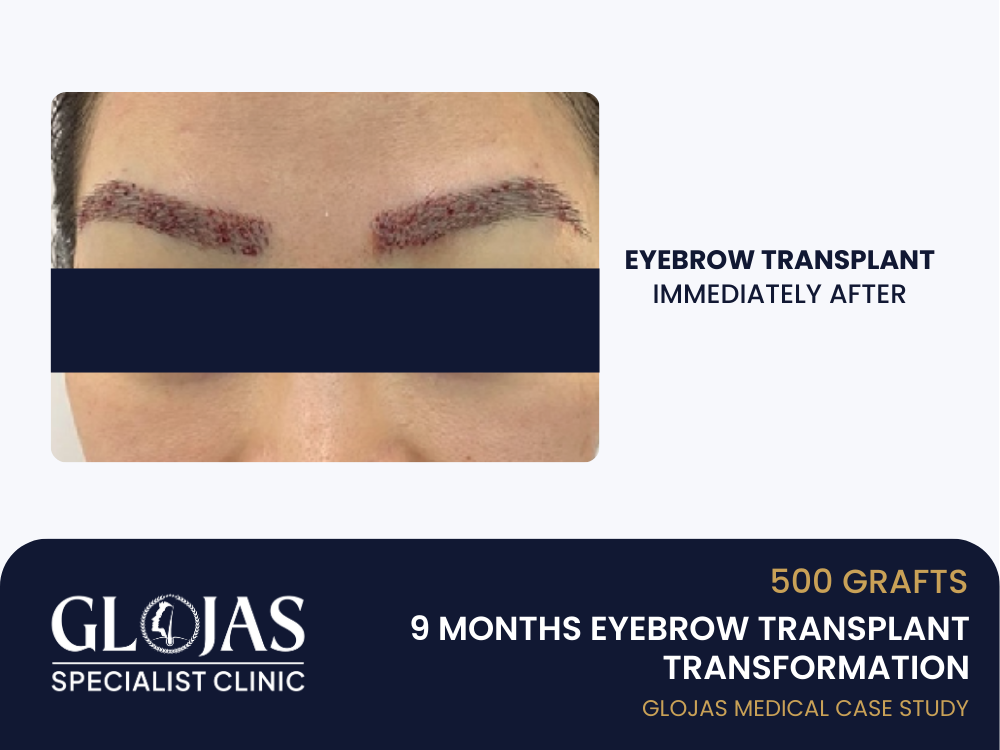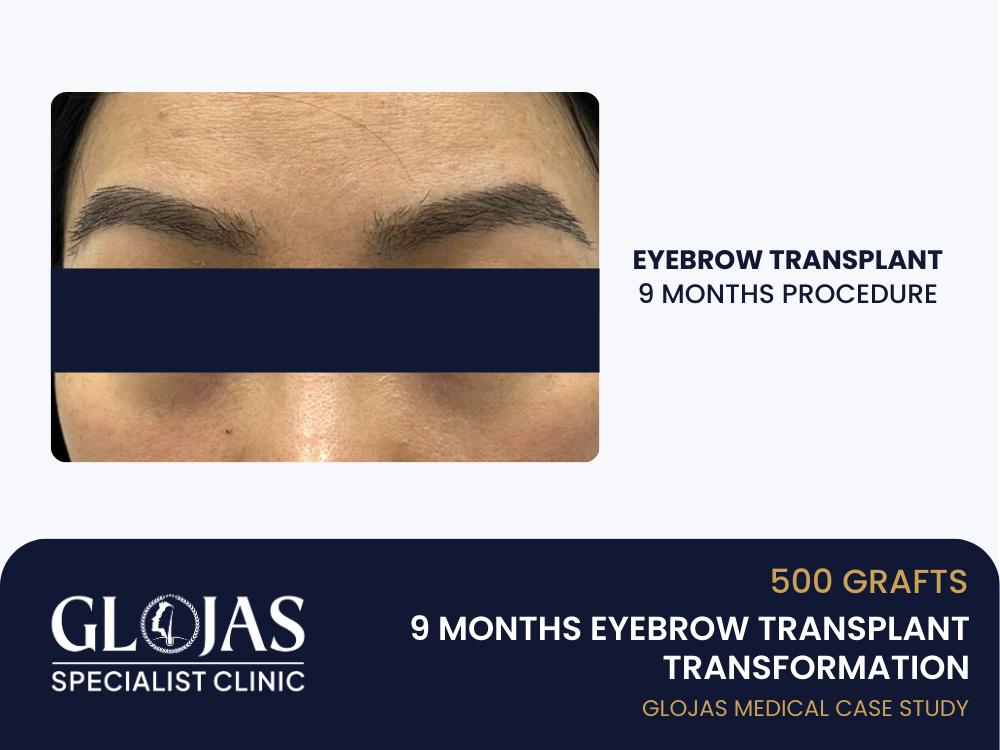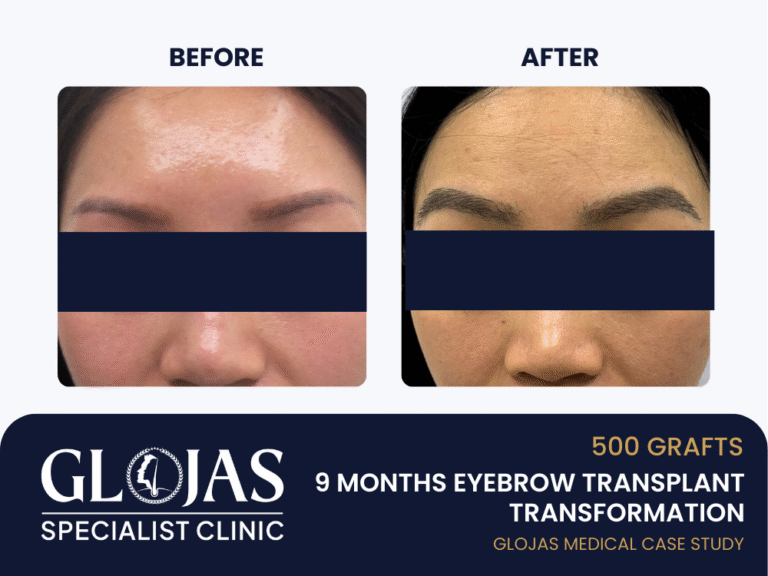Full, defined eyebrows have become a hallmark of beauty and confidence. For women suffering from sparse or thin eyebrows — whether due to genetics, over-plucking, or hormonal changes — it can be emotionally distressing and frustrating.
This case study features a 28-year-old woman who underwent a SMART™ FUE Eyebrow Transplant using 500 grafts to restore her eyebrow shape, symmetry, and fullness. After 9 months, her transformation was not only visible but also life-changing.
Patient Background
Name: Ms. K (identity anonymized)
Age: 28
Gender: Female
Concern: Naturally sparse eyebrows, worsened by years of over-plucking
Goals: Restore a fuller, natural eyebrow shape that suits her facial features
Previous Attempts: Microblading (faded quickly), brow makeup (daily use)
Ms. K felt her thin eyebrows made her look older and affected her confidence, especially when bare-faced. She seeks a permanent, low-maintenance solution that still looks natural up close.
Why SMART™ FUE for Eyebrow Restoration?
SMART™ FUE (Scalp Micro-Advanced Restoration Technique) is a refined version of traditional FUE, ideal for delicate areas like the eyebrows.
Benefits of SMART™ FUE for Brows:
Ultra-precise extraction and implantation
Natural hair growth direction & angle
No visible scarring
Minimal downtime
Long-term, permanent results
Direction, angling, and density control are critical in eyebrow transplants, and SMART™ FUE is designed specifically for such high-precision work.
Consultation & Planning – Eyebrow Transplant
Ms. K discussed her eyebrow goals with a hair restoration specialist during the consultation. A custom brow design was drawn to match her:
Facial symmetry
Brow bone contour
Desired thickness and arch shape
Key Findings:
Existing brows: Sparse throughout with patchy tails
Skin: Healthy and receptive to grafts
Donor area: Occipital scalp, where hairs are fine and resemble natural brows
500 grafts were deemed sufficient for her desired density and shape.
Procedure Day Summary

The transplant was performed in a single outpatient session lasting around 4 hours.
Step-by-step:
Local anesthesia is applied to the scalp and brows
500 follicular units harvested using micro-punch (0.7–0.8mm)
Grafts sorted (mostly single-hair units)
Recipient sites created in natural brow angle and direction
Grafts are implanted one by one to mimic the brow hair pattern
Ms. K reported minimal discomfort and was able to return home the same day.
Post-Procedure Recovery

Day 1–3: Mild redness and swelling, managed with cold compress
Week 1: Small scabs formed, which naturally flaked off by day 7–10
Week 3–4: Shedding phase (“shock loss”) — normal process
Months 3–5: New growth became visible
Months 6–9: Brow hairs thickened, shaped up naturally
9-Month Results

At her 9-month follow-up, Ms. K’s eyebrows were fully restored with natural flow, density, and arch.
| Aspect | Before | After 9 Months |
|---|---|---|
| Density | Thin, patchy, uneven | Full coverage, even shape |
| Tail Definition | Missing or faded | Clear, well-shaped tail and arch |
| Confidence Level | Relied on makeup, avoided a bare face | Comfortable without makeup |
| Maintenance | Daily makeup & touch-ups | None – only light trimming every few weeks |
Patient Feedback
“This was the best decision I’ve made. No more brow pencils. I feel confident waking up, going to the gym, or swimming without worrying.”
Ms. K shared that she received compliments from friends and even makeup artists who couldn’t tell she had a transplant.
Long-Term Maintenance
Grafted hair may need occasional trimming, as scalp hairs can grow longer
Results are permanent, but touch-up sessions are optional after 12+ months
No special care required after full healing
5 Frequently Asked Questions (FAQ)
1. Is eyebrow transplant better than microblading?
Yes — while microblading fades over time, an eyebrow transplant is permanent and uses real growing hair for a completely natural look.
2. Will the hair look too thick or unnatural?
No. For eyebrow transplants, only fine, single-hair grafts are used from the donor area, and implantation follows natural angles for realistic results.
3. How long does it take to see full results?
Most patients see full brow density and shape by 6 to 9 months after the procedure, with new hair growth beginning around month 3–4.
4. Do the transplanted brow hairs need trimming?
Yes. Since the hair comes from the scalp, it may grow longer than natural brows. Light trimming every few weeks keeps them tidy.
5. Is the procedure painful?
❌ No. The procedure is done under local anesthesia, and most patients report only mild soreness or tightness in the first few days.
Final Thoughts
This case study shows how 500 SMART™ FUE grafts can deliver dramatic yet natural-looking eyebrow restoration for women with thin or patchy brows.
At 9 months post-treatment, Ms. K no longer depends on cosmetics or daily shaping routines. Her new eyebrows frame her face beautifully and grow with her naturally.
If you’re tired of drawing your brows on every morning or struggling with uneven growth, SMART™ FUE eyebrow transplant offers a safe, permanent, and confidence-boosting solution.
